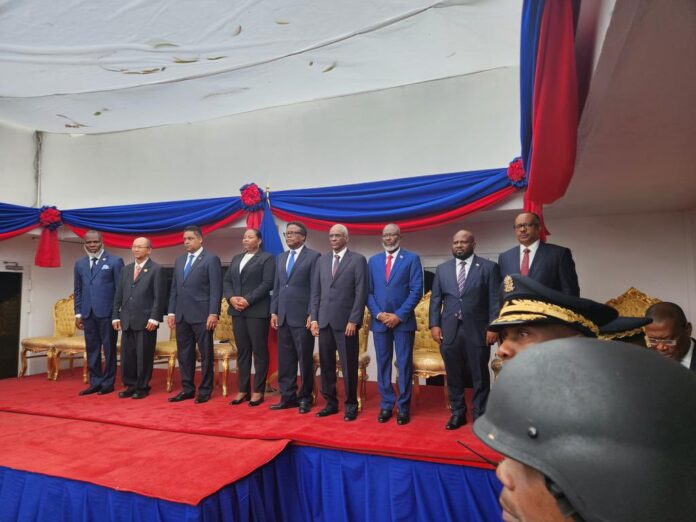A long-awaited transitional ruling council was sworn in Thursday in Haiti as the destitute nation enduring anarchy and rampant gang violence took a first step toward forming a new government and holding elections.
The Caribbean nation’s embattled, unpopular and unelected prime minister Ariel Henry submitted his formal resignation as Haiti looked to the new nine-member governing body to start restoring a semblance of order.
“This morning’s ceremony confers on you the reins of the destiny of the nation and of the people,” Michel Patrick Boisvert, until now the economy minister and now the acting prime minister in this transitional phase, told the eight men and one woman who make up the new governing body.
“Therefore, today is an important day in the life of our beloved republic,” he added.
Images shared on social media showed the council members greeted with fanfare at the presidential palace in Port-au-Prince. There, they took the oath of office and later they were sworn in at the prime minister’s office.
Henry — who had promised in March to step down once a council was installed — thanked the Haitian people “for the opportunity to serve our country with integrity, wisdom and honor.”
“Haiti will be reborn,” he wrote in his resignation letter, which was released Thursday but dated Wednesday from Los Angeles.
One of the council’s first main tasks will be to appoint a new full-fledged prime minister.
Haiti has no functioning parliament now or president, following the assassination of Jovenel Moise in 2021, and has not held an election since 2016.
This new transitional body is scheduled to lead the country until elections are held, and is supposed to yield power to an elected government by February 6, 2026.
A country of 11.6 million, Haiti has suffered from poverty, political instability and natural disasters for decades. It is the poorest country in the Americas.
Things got much worse in late February as powerful and well-armed gangs that control most of the capital Port-au-Prince and much of the country went on a rampage they said was aimed at toppling Henry.
They assaulted police stations, prisons, government buildings and the airport, triggering a social breakdown so acute that the head of UNICEF likened life in Haiti to a scene out of “Mad Max,” the movie which depicted a violent, lawless post-apocalyptic future.
Today in Haiti the gangs control 80 percent of the capital city and commit frequent random violence including murders, rape, looting and kidnappings.
“This is the task to which you are called, ladies and gentlemen members of the presidential council,” Boisvert said at the swearing in.
“To lead the country to peace, to economic and social recovery, to sacred unity, to participation for everyone, so as to address the challenge of the development and wellbeing of the country,” he added.
Boisvert had already taken over some official communications in recent weeks, with Henry in the United States and unable to return to his country after a trip to Kenya. The airport closed because of the gang violence.
It is unknown how these gangs will respond to the new council, made up of figures from across Haiti’s political spectrum, after voicing anger at their exclusion from transitional talks.
Gang leader Jimmy “Barbecue” Cherizier, whose 1,000-member G9 alliance controls parts of Port-au-Prince, was among those excluded.
The violence, exacerbated by prison breakouts in February, has sparked a worsening humanitarian crisis in Haiti, with aid agencies pleading for help amid growing hunger, surging poverty and a lack of health care.
The United States welcomed the swearing in of the new council and was represented by its ambassador.
“Today marks a critical step towards free and fair elections,” White House national security affairs spokesman John Kirby said.
The United Nations says some 360,000 Haitians are internally displaced, with the gang violence forcing 95,000 people to flee the capital and pushing five million into “acute hunger.”
Last year, a UN-backed force to be led by Kenya was tasked with deploying to the country and helping its beleaguered police rein in criminal gangs.
Kenya then said it had put plans on deploying the force on hold until the transitional council took power.













